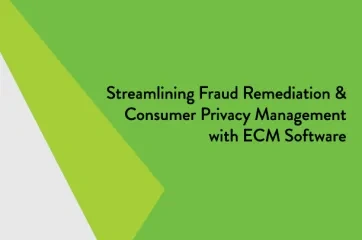An exception report lists the documents that are missing from an organization’s files. It can also include documents that are expired or require some other type of action.
For a bank or credit union, exception reports are most frequently used to track loans (commercial loans in particular). Since all documents in a loan file are included for a specific reason, each is important and should be collected and indexed in a timely manner. Financial institutions must resolve exceptions efficiently to manage risk, remain compliant with banking regulations, and maintain customer and member satisfaction.
Although frequently used in commercial lending, exception reports could also be used for non-commercial accounts, such as deposits or trusts.
Why Exception Tracking is Critical
Well-structured exception reports in banks and credit unions empower users to quickly sort and filter exception data. Credit or loan admins use such filters to generate reports that consider a variety of variables, including officer, branch, and account-related data. Consistent and in-depth analysis of exception data helps banks and credit unions identify situations that require immediate action, thereby protecting their interests related to:
- Defaults: If a recorded deed of trust isn’t filed and a loan defaults, the financial institution may be unable to foreclose on a property.
- Collateral: Without auto insurance tracking, a wrecked car becomes lost collateral.
- Collection: A missing promissory note inhibits the bank or credit union’s ability to collect on the debt.
- UCCs: UCC collateral must be filed every five years.
- Compliance: Missing documents can lead to poor compliance exams by regulators.
Common Ways to Track Exceptions
There are several methods that banks and credit unions use to track exceptions and generate exception reports.
- Spreadsheets: One inexpensive means is via an electronic spreadsheet. Although cost is minimal in this scenario, it is time-intensive, as information must be entered manually. Reports are generated from the spreadsheet and then routed to the appropriate bank staff member via email. Printed reports may need to be mailed or couriered to a separate location. Introducing the human element, therefore, also can result in human error.
- In-house Databases: An in-house, homegrown database is another option for tracking exceptions; the same pros and cons of a spreadsheet apply to a database as well. Databases also introduce additional technical challenges, requiring involvement by IT.
- Exception Report Software: Automated software, such as AccuAccount, generally provides a more streamlined approach to tracking exceptions, generating reports, and delivering flagged items to employees for resolution. A financial institution can customize the software to flag “critical” exceptions that must be dealt with immediately, such as a recorded deed of trust within 30 days or a title policy within 60 days. Automated exception reports can be run daily if the financial institution desires, and they are automatically routed via email to the appropriate compliance officer, insurance clerk, or other bank or credit union employees as necessary.
Exception Report Resources
For more exception report information, be sure to check out our extensive resource library with free document tracking spreadsheets, whitepapers, and eBooks.
Looking for more banking definitions? Check out our banking definitions page.














